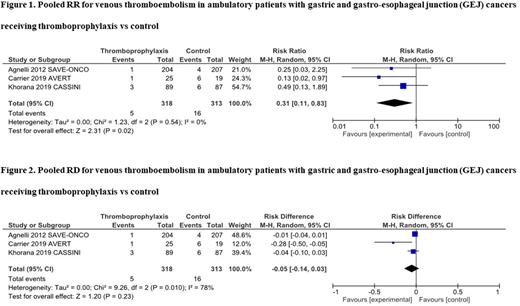Abstract
Introduction: Advanced gastric cancer is demonstrated as a highly thrombogenic cancer where the score of 2 is assigned per Khorana score (KS). POTP is currently suggested to patients with KS of 2 and above by recent clinical practice guidelines. We conducted an updated meta-analysis to evaluate the benefit of POTP with low-molecular weight heparins (LMWH) and direct oral anticoagulants (DOAC) in patients with gastric and gastro-esophageal junction (GEJ) cancers receiving chemotherapy.
Methods: Comprehensive literature across MEDLINE and EMBASE databases were searched from inception through June 30, 2022, using search terms 'thromboprophylaxis’ OR 'anticoagulation’ OR 'low-molecular-weight heparin’ OR 'direct oral anticoagulants’ AND 'stomach cancer'/ 'gastro-esophageal junction cancer'. The references of all potential studies were also reviewed for any additional relevant studies. The RCTs with reduction in VTE as a primary or secondary endpoint were incorporated in the analysis. The primary meta- analytic approach was a random effects model using the Mantel-Haenszel (MH) method. It was used to calculate the estimated pooled risk ratio (RR), and risk difference (RD) with 95% confidence interval (CI). I2 statistic and Cochran's Q- statistic were used to assess heterogeneity among the studies.
Results: A total of 631 patients with gastric and GEJ cancers from a subgroup of three RCTs were included. The prophylactic doses of LMWH and DOAC (rivaroxaban and apixaban) were used in the studies. The duration of LMWH and DOAC ranged from 3 to 6 months. The randomization ratio was 1 to 1 in all studies. The I2 statistic for heterogeneity was 0, suggesting homogeneity among RCTs. The VTE incidence was 5 (1.6%) in PATP group and 10 (5.1%) in control group with a RR of 0.31 (95% CI: 0.11 to 0.83, P = 0.02). The absolute RD was -0.05 (95% CI: -0.14 to 0.03, P= 0.23) with an estimate of the number needed to treat (NNT) of 29 to prevent one VTE event.
Conclusions: POTP in gastric and GEJ cancers statistically significantly decreases VTE events, with relative risk reduction of 69% with a NNT of 29 to prevent one VTE event. Even though the ASCO and the International Thrombosis and Cancer Initiative suggested POTP in patients with gastric cancer by virtue of KS of 2, our meta-analysis findings do not support the routine use of POTP in patients with gastric and GEJ cancers receiving chemotherapy.
Disclosures
Oo:Thein Hlaing Oo served on the advisory board of Bristol-Myers Squibb.: Other: Thein Hlaing Oo served on the advisory board of Bristol-Myers Squibb.
Author notes
Asterisk with author names denotes non-ASH members.


